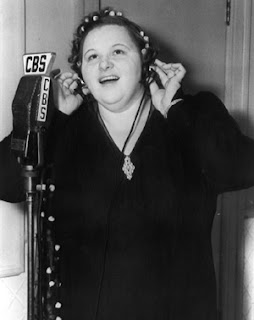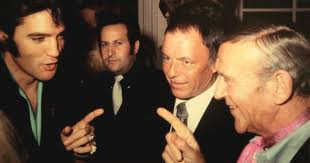Last week it was amazingly 25 years since the death of Kate Smith. Kate was more than just a singer - she was a voice of America during the 1930s. I remember Eddie Cantor making a comment about Kate Smith and her weight. He said "Kate Smith is so large because she has to hold a heart that is so big." She never married or had any children, but from her debut in the 1920s to her death in 1986 she had millions of fans. Fans that never met her, but they still thought of her as part of their family. Here is an obituary from the day she passed away - June 17, 1986:
Kate Smith, whose vibrant voice made ''God Bless America'' an unofficial national anthem and was one of the most popular singers of the century, died yesterday afternoon at Raleigh (N.C.) Community Hospital. She was 79 years old and lived in Raleigh.
President Reagan expressed sorrow over her death, saying: ''Kate Smith was a patriot in every sense of the word. She thrilled us all with her stirring rendition of 'God Bless America' and sang with a passion which left few eyes dry.''
Miss Smith had been in poor health since 1976, when she suffered brain damage as a result of a diabetic coma. In January, her right leg was amputated because of circulatory problems associated with her diabetes, and on May 9, she underwent a mastectomy.
But it was the robust and joyful young singer who never took a formal music lesson whose voice became one of the most listened-to by a nation struggling through the Great Depression and World War, still holding fast to an optimism for the future.
Everything about Kate Smith was outsized, including Miss Smith herself. She recorded almost 3,000 songs -more than any other popular performer. She introduced more songs than any other performer - over a thousand, of which 600 or so made the hit parade.
She made more than 15,000 radio broadcasts and, over the years, received more than 25 million fan letters. At the height of her career, during World War II, she repeatedly was named one of the three or four most popular women in America. No single show-business figure even approached her as a seller of War Bonds during World War II. In one 18-hour stint on the CBS radio network, Miss Smith sold $107 million worth of War Bonds, which were issued by the United States Government to finance the war effort. Her total for a series of marathon broadcasts was over $600 million.
President Roosevelt once introduced her to King George VI of England, saying: ''This is Kate Smith. Miss Smith is America.''
Kate Smith had been a national singing star almost from the outset of her broadcasting career in 1931. But her identification with patriotism and patriotic themes dates from the night of Nov. 11, 1938, when, on her regular radio program, she sang "God Bless America" -- an Irving Berlin song originally written for Berlin's 1918 musical "Yip, Yip, Yaphank."
In a short time, the song supplanted ''The Star-Spangled Banner'' as the nation's most popular patriotic song. There were attempts - all unsuccessful - to adopt it formally as the national anthem.
For a time, Kate Smith had exclusive rights to perform ''God Bless America'' in public. She relinquished that right when it became apparent the song had achieved a significance beyond that of just another new pop tune.
Mr. Berlin and Miss Smith waived all royalties from performances of ''God Bless America.'' The royalties continue to be turned over to the Boy and Girl Scouts of America.
''God Bless America'' became a standard in the repertory but both the song and Miss Smith experienced a curious resurgence of popularity beginning in 1969 when the Philadelphia Flyers professional hockey team began to substitute her recording of the song for ''The Star-Spangled Banner'' before games.
The team began to win on nights the song was played. As the team improved, the record was reserved for Mrucial games and, at the end of the 1975-76 playing season the Flyers' record was 41 wins, 5 losses and 1 tie on nights Kate Smith sang ''God Bless America,'' either on record or in person. The first three of the five or so times she appeared in person, the Flyers' opponents were scoreless. Sang for Troops During World War I Kathryn Elizabeth Smith was born May 1, 1909, in Greenville, Va., and grew up in Washington, D.C. Her father was a wholesale magazine distributor. As a baby, she failed to talk until she was 4 years old. But a year later she was singing in church socials and by the time she was 8 she was singing for the troops at Army camps in the Washington area during World War I. Alarmed by his daughter's evident penchant for the stage, William Smith made her take up nursing at George Washington University Hospital. She stuck it out a few months, quit and got herself on the bill at Keith's Theater as a singer.
Heading the bill was the actor and producer Eddie Dowling who signed up the young singer for a revue he was preparing. It was called ''Honeymoon Lane,'' and it opened in Atlantic City on Aug. 29, 1926. A month later it moved to Broadway.
A review in The New York Times on Oct. 31, 1926, under the heading ''A Sophie Tucker Rival,'' said:
''A 19-year-old girl, weighing in the immediate neighborhood of 200 pounds, is one of the discoveries of the season for those whose interests run to syncopators and singers of what in the varieties and nightclubs are known as 'hot' songs. Kate Smith is the newcomer's not uncommon name.'' She was actually only 17 at the time.
From ''Honeymoon Lane,'' Miss Smith went into the road company of Vincent Youmans's ''Hit the Deck,'' where she won acclaim singing ''Hallelujah!'' Back in New York she took the company lead in George White's ''Flying High,'' which opened at the Apollo Theater on March 3, 1930, and ran for 122 performances.
As Pansy Sparks, Miss Smith's role was to be the butt of Bert Lahr's often cruel jibes about her girth. She said later that she often wept with humiliation in her dressing room after the show.
One evening, Ted Collins, a representative for Columbia Records, saw the show and heard Kate Smith sing for the first time. He sent a note backstage and asked her to see him in his office. When she appeared a few days later, it marked the beginning of a show-business association that lasted 34 years, ending with Mr. Collins's death in 1964.
Mr. Collins advised the successful but unhappy girl to take advantage of her good voice and to forget about comedy. The first booking he got for her was the Palace, where she lasted 11 weeks, setting a new record for a single performer.
In 1931, radio had overcome its early self-consciousness and was coming into its own as an entertainment medium. Mr. Collins arranged for a 15-minute nightly show for his client and she made her radio debut on May 1, her 22d birthday. The young singer, billed as Kate Smith and her Swanee Music, made her debut one week after another singer, the coloratura soprano Lily Pons, began her radio career.
For her first show, Miss Smith chose as her theme the song that was to become her trademark, ''When the Moon Comes Over the Mountain.'' She also used for the first time her opening, ''Hello, everybody!'' and her closing, ''Thanks for listening.'' Within six months, the young star had a sponsor, La Palina cigars, a long-term contract and a four-figure salary.
In 1938, the year she introduced ''God Bless America,'' Miss Smith began a daytime radio program of down-home philosophy, comments on current events and women's affairs. The show was an immediate success, but it did prompt some of the harshest criticism Miss Smith ever received.
The barbs came from The Daily Worker, the newspaper of the American Communist Party, in 1949. After noting that most of the program was devoted to inconsequential pap, The Daily Worker said Miss Smith and Mr. Collins devoted a few minutes to the problems of the Roman Catholic Church under a repressive Government in Czechoslovakia. The Worker went on to call Miss Smith ''Kate, the red-baiter, Kate the distorter of Communist policy, Kate the apologist for interventionists in Eastern Europe.'' The article concluded: ''This is the real Kate.''
The Worker's criticism had no noticeable effect on her career, which branched into television the following year, 1950, with ''The Kate Smith Variety Hour.''
The show lasted five years. When it was dropped in May 1955, the network received 400,000 protest letters. Later that year, she returned as a guest on the Ed Sullivan show. The public response led to a contract for five more appearances, but Mr. Collins suffered a heart attack and Miss Smith canceled all her activities until he had recovered.
In January, 1960, she returned with a new television variety show on CBS. It received high critical acclaim but low ratings and was dropped after six months. The death of her mother, Charlotte Yarnell Smith, in 1962, followed by the death of Mr. Collins two years later, threw Miss Smith into a period of depression that ended in July 1965, when she announced she would return to television that fall. Over the next decade she performed regularly on variety shows hosted by Ed Sullivan, Dean Martin, Andy Williams and others.
During her long career, Miss Smith rented various apartments in New York, most recently a three-bedroom suite in the Sheraton Motor Inn at 42nd Street and the Hudson River. She once told an interviewer that she had no interest in traveling abroad but loved to watch the ocean liners coming in and out from the motel roof.
For 40 years, she kept a summer home on a small island in Lake Placid, N.Y. She also had a home in Arlington, Va. She lived modestly but was estimated at one time to have amassed some $35 million during her working life.
Two autobiographical books were published under her name: ''Living in a Great Big Way'' in 1938, and ''Upon My Lips a Song'' in 1960. She also wrote the ''Company's Coming Cookbook,'' in 1958. Miss Smith was, not surprisingly, a prodigious eater and a good cook. She gave her weight variously as 215, 225 or 235 pounds, but usually with a wink or a booming laugh because it obviously was higher. Under Mr. Collins' tutelage she had come to terms with her figure.
At one point in the 1960's, she shed 90 pounds over a four-year period, bleached her hair, and discarded the dignified dark dresses she had worn for years. But, she later declared, she was uncomfortable that way and went back happily to ''real chocolate fudge sundaes.''
Because of their long and close business relationship, Miss Smith and Mr. Collins were thought to be married. They were not, and a form letter was sent to anyone who inquired. It read: ''Miss Smith is not married. Mr. Collins is married, has one daughter and two grandchildren.''
In 1965, after attending Roman Catholic services for 25 years, Miss Smith was baptized into that religion at the local church in Lake Placid. She was baptized by the same priest who had administered the last rites to Mr. Collins.
SOURCE
























